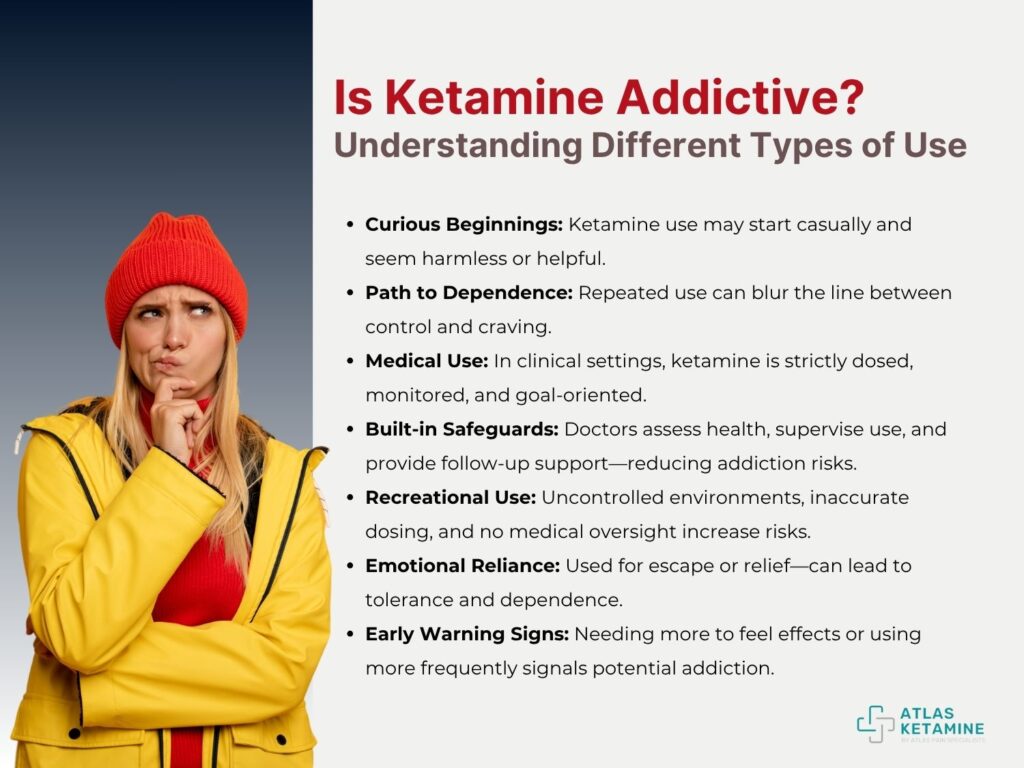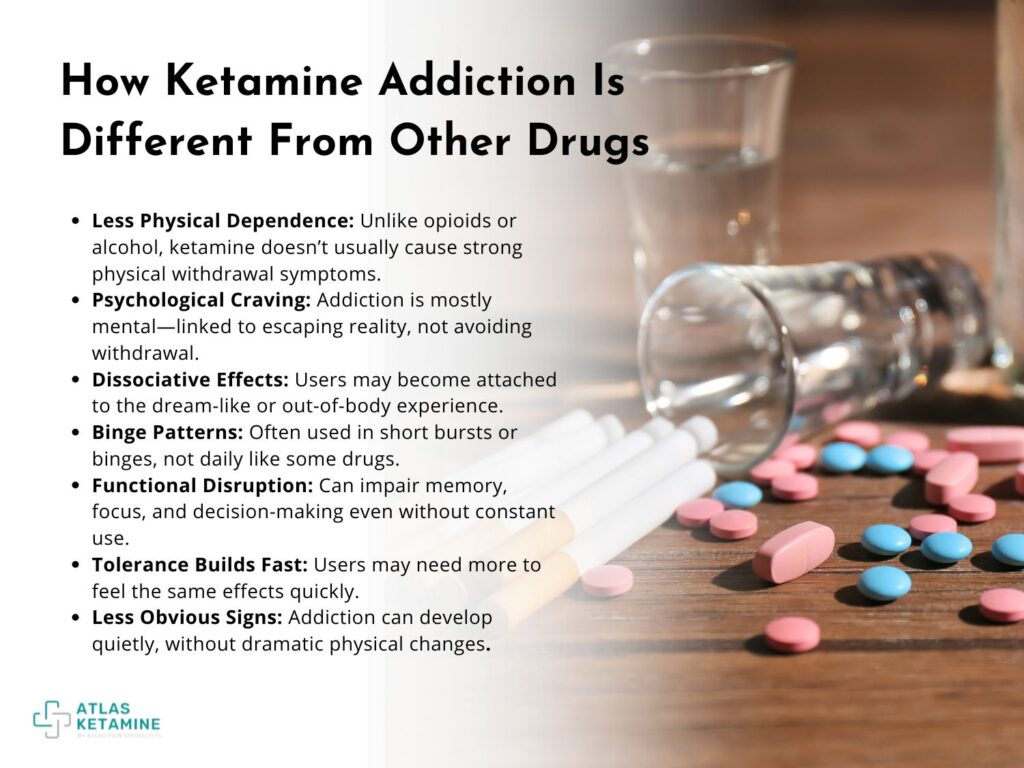You might have first heard about ketamine in a hospital setting or maybe from a friend who mentioned it in a totally different context. It’s strange how one substance can show up in such opposite places, isn’t it?
Is Ketamine Addictive? Yes, ketamine can be addictive, especially when used frequently or outside of medical supervision. This contrast is what makes it so misunderstood and, at times, controversial.
It’s easy to assume that anything with a medical label is automatically safe, especially when it’s being prescribed or monitored. But safety doesn’t mean risk-free as even medicines with healing potential can take a wrong turn if they’re misused.
How Does Ketamine Work?
Ketamine is described in a few different ways depending on the setting. It can be described as a powerful anesthetic, others talk about it recreationally, and lately, you may have seen it mentioned in mental health circles.
All of these things are true in their own way, but that doesn't mean they’re simple.
What Ketamine Is
Ketamine began as an anesthetic in the 1960s and still plays a role in surgery and emergency medicine today. It’s fast-acting and doesn’t slow your breathing the way other sedatives might, which made it especially useful in war zones and hospitals.
Over time, it moved beyond operating rooms into entirely different spaces. When used medically, ketamine is usually given through an IV or injection, in carefully measured doses.
It’s also been adapted for mental health treatments like depression, often in clinics under supervision. On the street, it often comes as a powder, pill, or liquid, used for its ability to create intense dissociation or a dreamlike state.
Why It's Used in Both Medical and Recreational Settings
In hospitals, ketamine helps manage pain or bring someone into sedation before a procedure. More recently, doctors have used low doses to treat people who haven’t responded well to traditional antidepressants.
These sessions aren’t quick fixes, but for some people, they open a door that nothing else has.
Outside of clinical use, ketamine gained popularity for its ability to make people feel disconnected from their surroundings.
Some describe the experience as floating, watching themselves from a distance, or escaping altogether, but it doesn’t come without risk.
How It Affects the Brain and Body
When ketamine enters your system, it quickly changes how certain brain chemicals behave, especially one called glutamate. This shift can lead to a fast change in how you feel, think, or even perceive reality. That’s one reason it has shown promise in helping people with depression.
Physically, ketamine can raise your heart rate, blur your vision, or leave your body feeling heavy or unresponsive. Mentally, it can create a break from reality that lasts a short while but feels much longer in your head.
For some, that disconnection fades without a problem. For others, it becomes something they want to return to, even when they know it’s not helping anymore.
The Fine Line Between Use and Misuse
At first, ketamine can all seem pretty harmless. You try something once, maybe twice, and it feels interesting or even helpful.
It may pass as just testing it out, or going with what feels right in the moment. But ketamine, like anything that shifts how you feel or think, can slowly blur the line between control and craving.

- Responsible Ketamine Use in Medical Treatment
In a clinical setting, ketamine is used with precision. It’s given in small, carefully monitored doses, often as part of a larger mental health treatment plan.
Doctors usually assess your mental and physical health first, then work with you to set a clear goal. You know what to expect, how long the session will last, and what kind of follow-up support is in place.
This kind of structure creates a safe space for the experience and reduces the chance of chasing the feeling outside of treatment. You’re not just handed a dose and left alone, but there’s intention behind it.
- Recreational Use
Things look very different when ketamine is used recreationally. The setting is often unpredictable, doses aren’t measured accurately, and there’s no one checking in to see how it’s affecting you.
You might start using it to feel relaxed or escape from stress, and it can seem like it’s helping, for a while. But when you start relying on it more often, or you notice you need more to feel the same effects, that’s when things shift.
It’s easy to lose track of how much you’ve used or how often you’re reaching for it.
Can You Get Addicted to Ketamine?
Ketamine addiction doesn’t always follow the same path as something like opioids or alcohol. That doesn’t mean it can’t become a serious issue.
Misuse can show up in small ways, like feeling irritated when you can’t access it, planning your social time around it, or telling yourself you’re just unwinding. You might start using alone, or during times when you didn’t plan to, and still convince yourself it’s under control.
What Addiction Really Means in This Context
Addiction shows up in how you think, how you plan your day, or how often you find yourself needing something to feel okay. With ketamine, it’s usually more psychological.
- You might not feel sick without it, but your mind keeps circling back to the idea of using it again. That mental loop can be just as heavy as physical symptoms.
- You might notice you’re thinking about the next time you’ll use it even when you just finished.
- You might start building routines around it or turning to it in moments when you’re overwhelmed, bored, or trying to avoid something hard.
How Ketamine Addiction Is Different From Other Drugs
Unlike drugs that create strong physical dependence, ketamine doesn’t usually cause your body to react with extreme withdrawal symptoms when you stop. That makes it easier to convince yourself that everything is fine.
There’s no shaking, no sweating, no nausea, so it must not be an addiction, right? But needing something mentally to cope, escape, or simply feel normal can still hold the same weight.
The absence of intense withdrawal doesn’t mean the habit hasn’t taken over. You might stop for a while and feel okay physically, only to find yourself craving it emotionally when life gets tough or boring.

The Role of Physical vs Psychological Dependence
Physical dependence is when your body gets used to a drug and reacts when it’s taken away. Psychological dependence is when your thoughts, emotions, or behaviors start to revolve around that drug.
Ketamine falls more into the second category as it can become a crutch, something you lean on even when part of you knows you don’t need it. That kind of pull can start once in a while, then become a regular thing after work or before social events.
Before you know it, it’s something you think about when you’re not using it. That’s the kind of pattern that deserves your attention, even if it doesn’t feel like the addiction stories you’ve heard before.
How Tolerance and Cravings Can Develop
At first, one small dose might feel like more than enough. The experience is strong, maybe even overwhelming, and you walk away from it thinking it’s something you’ll only need occasionally.
Then time passes, and it doesn’t hit quite the same way. You notice the feeling is shorter, or less intense, and you wonder if you just need a little more to get back to that place. This is often where people start adjusting their use without even realizing it.
You tell yourself it’s still under control because it’s not all the time. But somewhere in the back of your mind, you start chasing that first experience again, trying to recreate a moment that just isn’t coming back in the same form.
Why Some People Feel the Need to Use More Over Time
Your brain adjusts fast. That’s one of its strengths, but it can also work against you in situations like this. After a few uses, your system gets more familiar with ketamine, and the same amount doesn’t create the same reaction.
You end up using more, not because you want to go overboard, but because you're trying to feel something again. This need for more is called tolerance.
It’s subtle at first. You may not even notice how your dose is creeping up or how the gap between uses is getting smaller. You just know that what used to feel powerful now feels muted. So you keep adjusting, hoping to bring back the magic.
What the Research Says
You’ve probably come across articles that praise ketamine as a breakthrough in mental health treatment. You’ve also likely seen headlines warning about its dangers.
It’s easy to feel caught between two extremes, hope and fear, with no real way to know what’s actually true. Science moves slowly, and that’s not always helpful when you’re trying to make sense of your own situation now.
Studies on Ketamine’s Addictive Potential
Most researchers agree that ketamine has a lower risk of physical addiction compared to substances like opioids or benzodiazepines. That doesn’t mean it’s safe to use without limits.
The psychological pull is real, and some studies show that frequent use can lead to patterns of compulsive behavior, especially in people who use it recreationally or without supervision. One key finding is that regular, high-dose use can change how certain brain systems function.
These changes don’t always cause full-blown addiction, but they can trigger tolerance, cravings, and even memory or mood issues. In short, while ketamine isn’t in the same category as heroin or alcohol in terms of dependence, it still carries risks you can’t ignore.
What We Know So Far and What’s Still Being Debated
Research into ketamine’s medical use, especially for depression, PTSD, and chronic pain, is still growing. Early results are promising, with many people reporting fast relief after just one or two treatments.
But long-term data is limited. We don’t yet know how repeated use over months or years could affect the brain or body, especially outside of medical supervision.
There’s also debate around how often it should be used in therapy, and how to prevent people from becoming too reliant on it. Some clinics space treatments out over weeks. Others offer maintenance doses more often.
Insights From Mental Health Professionals
Most therapists and doctors who work with ketamine don’t see it as a cure on its own. They treat it as one part of a larger picture usually alongside therapy, lifestyle changes, and regular check-ins.
Many of them also keep a close eye on how often someone is asking for treatment, and whether the request feels need-driven or goal-driven. When ketamine is treated as a tool instead of a solution, the outcomes tend to be better.
Professionals often focus on helping you understand why it works for you, what triggers your urge to use it, and how to avoid slipping into unhealthy patterns. That kind of support matters more than the dose itself.
How Long Does Ketamine Stay in Your System?
Part of the reflection in using ketamine includes understanding how ketamine affects your body, not just emotionally or mentally, but physically too. That’s where the question of how long it stays in your system becomes more than just a scientific fact.
It matters when you’re trying to space out your use, when you’re curious about what your body is still holding onto, or when you’re preparing to stop altogether. Knowing how long it lingers helps you reconnect with your body, take note of changes in your mood or clarity, and understand what’s happening.
What you can do is stay aware, ask honest questions, and make decisions that reflect the kind of relationship you want to have with yourself. No matter where you are right now, it’s possible to step back, reset, and move forward with more understanding than you had before.
